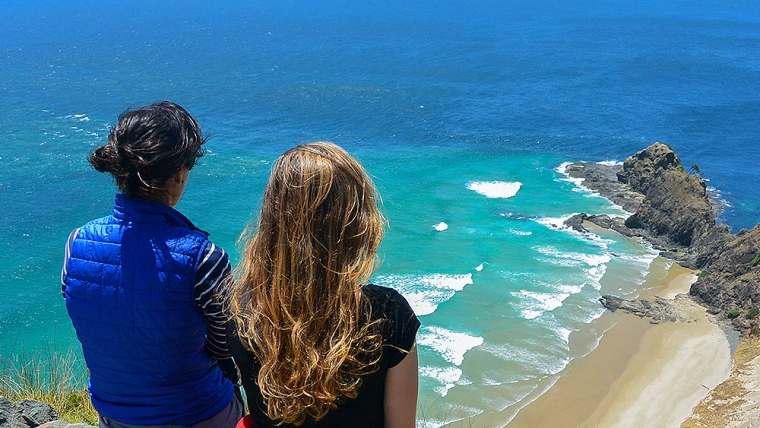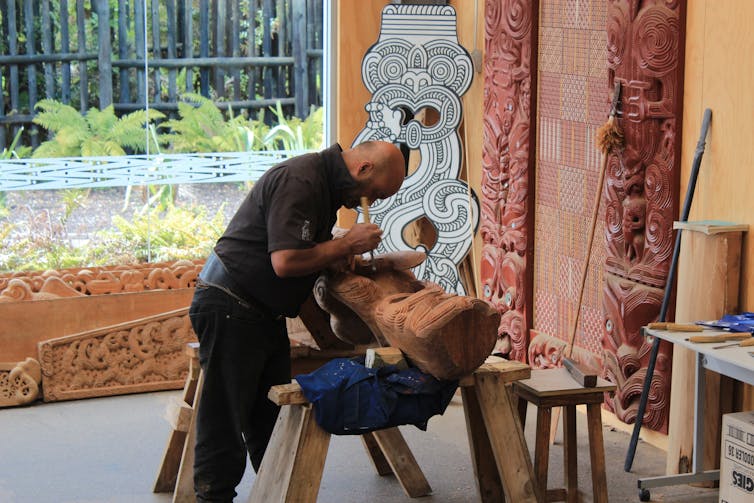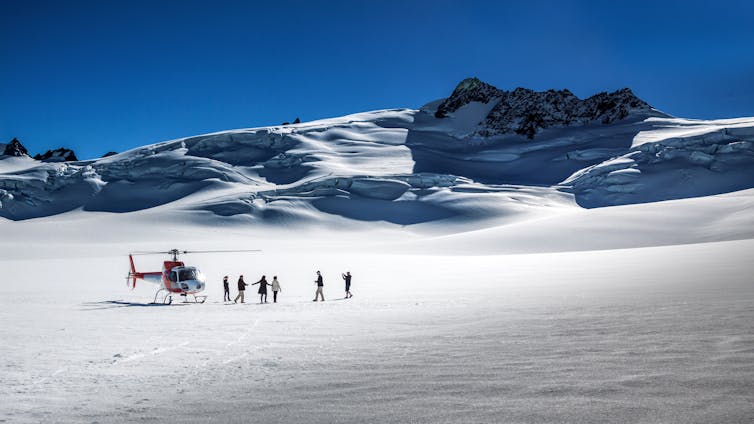
By Regina Scheyvens & Apisalome Movono*
With the reopening of New Zealand’s borders from next week, the future of tourism comes into sharp relief. Flattened by the pandemic and having survived on domestic consumption for two years, the industry has a choice: try to revive the old ways, or develop a new model.
If tourism minister Stuart Nash has his way, there is no going back. “Tourism won’t return to the way it was,” he told Otago University’s Tourism Policy School recently, “it will be better.”
But how? The question is coming down to the various definitions of “value” – both the monetary and less tangible kinds.
When Nash addressed a tourism summit in late 2020, “high value” clearly meant “high spending”. New Zealand would “unashamedly” target the wealthy – the type of tourist who “flies business class or premium economy, hires a helicopter, does a tour around Franz Josef and then eats at a high-end restaurant.”
The minister also asked: “Do you think that we want to become a destination for those freedom campers and backpackers who don’t spend much and leave the high net worth individuals to other countries?”
There was immediate concern that such a policy would overlook the broader value of “lower-end” tourism: backpackers and other budget tourists might not spend as much per day, but they tend to travel for longer periods, bring dollars to remoter locations, and often work in understaffed industries like horticulture and hospitality.
At the same time, high-spending tourists hiring helicopters tend to place a high per-capita burden on the environment and contribute more to climate change. Clearly, what constitutes “high value” is up for debate.
From high value to high values
Now, however, the minister is defining the high-value tourist differently. They give back more than they take, appreciate those working in the tourism sector, are keen to learn about the people and places they are visiting, are environmentally aware and offset their carbon emissions.
This shift in thinking prompted one participant at the tourism policy school to suggest that instead of “high value” tourism, New Zealand needs to be talking about “high values” tourism.
The sentiment chimed with the policy school’s theme of “structural change for regenerative tourism”, and a general feeling that this will involve looking inward to certain core values that matter to the country.
Attendees – including industry leaders, academics, government officials and tourism business owners – supported the idea that “regenerative” in this context matches the important Māori values of kaitiakitanga, kotahitanga and manaakitanga, which should inform the future direction of tourism in Aotearoa.

Mana and manaakitanga
The implications of this approach were well articulated by Nadine ToeToe, director of Kohutapu Lodge, an award-winning tourism business in the central North Island. She proposed a new tourism model that advances manaakitanga (kindness and hospitality) to guests, while also enhancing the mana of their hosts, local communities and the surrounding environment.
With her business based in the area around Murupara, which is beset by historical injustices and downturns in the forestry industry, ToeToe described the potential of tourism to move beyond simple service industry conventions.
Rather, more authentic, culturally embedded experiences could be offered, based on building respectful relationships with the people and places visited. This would mean manaakitanga was reciprocal, benefiting both guests and local communities.
By being designed to enhance people, community and place, tourism would necessarily break from the old volume-driven model that was putting many natural environments under significant pressure prior to the pandemic.

Time for a reset
Of course, it is one thing to suggest that tourism respect the wairua (spirit) of the land, and quite another to put the legislative and regulatory frameworks around a pathway to sustainability.
To a degree this is beginning to happen already. For example, following concerns about a promised crackdown on freedom camping, the minister stepped back from banning vans that weren’t self-contained. However, proposed policy changes will go to select committee this year, with new rules to be rolled out gradually from next summer.
These should align with the minister’s view that “… at the heart of the new law will be greater respect for the environment and communities through a ‘right vehicle, right place’ approach” (with fines of up to NZ$1,000 for offenders).
The challenge now is to broaden that vision beyond individual businesses, or pockets of concern such as freedom camping, to encompass the entire industry. Because there can be no better time than now for a values-based reset of New Zealand tourism.![]()
*Regina Scheyvens is Professor of Development Studies at Massey University, and Apisalome Movono is Senior Lecturer in Development Studies at Massey University.This article is republished from The Conversation under a Creative Commons license. Read the original article.
33 Comments
Yes. Any tourism that relies on cheap imported or itinerant labor is is not doing us any good. We only want tourism that supports full time permanent Kiwi staff and is sufficient for them to buy their own homes. Anything less is a drain on our economy, requiring social welfare subsidies, adding to our large infrastructure and social services deficit and if they are itinerant overseas tourists their wages only benefits them or their country.
Does this mean too reluctance to engage with foreign tourists, who arrive in plane loads, planes that that same foreign country owns and too the buses that they travel on, the hotels they stay in and the restaurants where they eat.
Exactly and you forgot to mention that it was all paid for back in China,so the true amount of money coming into our country is near to zip. ( I did hear that the inbound tourists are each handed $10,000 before the flight and then hand it back to the organizers once through the boarder. The purpose being to get money out of China to buy our assets) The pointer is that our economy has barely noticed the 2 years of no foreign tourists apart from winging Queenstowners and eateries. Most of the Kiwis affected would do the country more good if they pivoted to other employment where there are shortages that meaningfully effect our economy.
Confidently peddling hearsay filled with spelling mistakes, then kicking struggling businesses when they are down from a freak pandemic. I hope i don't get seated next to you at dinner.
You seem to forget that some of those 'low value tourists' become kiwis in the future because our values align. There are also a wide range of tourist types, our targeting sounds more like political spin than an actual policy, and some tourists don't want the the Maori experience, they want to see our sights, probably, those are the ones with the big money we really want. When I go to - say - Italy I am the same.
Of course, to the point about not wanting people to do the low paid jobs and 'kiwis with full-time work", tourism happens 7 days a week, 18 (or more) hour a day. The times when kiwis don't want to work, doing jobs they don't want to do. And there aren't the kiwis to do the jobs anyway, 250,000 people left NZ from mid Feb to Mid June 2020, most of those the shorter term visitors.
What happened next? Oh yeah, there aren't enough kiwis to do the jobs, there are widespread and sectoral job crises, there are no people to service the new tourists. Where do we got those kiwiws from? Immigratio or short term visitors. The ones you don't want.
The governments policies are yet more failing ideologies, because we can't do they work they profess needs to be done, or else we can't pick our fruit, make our food, grow our forests because those workers will migrate. What then?
sorry to be straight forward, NZ's tourism price tag is way to high for its true value, and especially after the lord of ring hype almost extinguish.
No, but the value is diminished by pulling up to a world class location and having to park alongside a horrific looking camper with their underwear drying on the roof.
SimonRo - sounds like the British in the colonial days. Superiority is so funny to observe; those who assume they have it, have so much further to fall. I also notice, as I get older, that the more they disdain, the less likely that there will be any quality about them which could be held as justification.
But that camper you are pulling up too is a kiwi family on holiday, and unable to afford the price most tourist activities NZ..
So we ban Kiwis from these spots?
I don't mean the 70s camper that tends to trigger fond memories in NZ culture, but rather the 'wicked' camper minivans which are iconic in this whole discussion of too-cheap tourism in NZ. I know the cost of living as a family in NZ doesn't leave space for holidaying very much without careful optimization of activities and destinations, most of us get that.
I will always smile hello at a foreign couple tumbling out of their holiday minivan but it comes to mind straight away that we cannot afford to have many of them here. Perhaps we will find a way to limit the numbers of cheap van rental or car rental nights that are available each month... something like that.
Those people are probably the ones working in the bars and restaurants you used to go to, servicing the tourism ventures you visited in the NZ holidays, and helping out in the hotels. Possibly also the ones workijg in factories to provide your food, or export to earn NZ Inc income.
When 250,000 of them left in Feb-June 2020, that labour pool disappeared. Now the government won't let them back in. Who will work to help our industry? The growing number of "work ready" people on Job Seeker benefits? Considering we already have record low unemployment and plenty of jobs for them to do it seems unlikely if they are not already employed.
Nor does NZ need to , any more than it wants to, rely on intercepting at the border, a variety of poly bagged, dead birds, fungi, feral meat & entrails, and bat stew amongst other delectables of course!
All good. We can leave the tight fisted tourists looking for a budget experience to someone else.
I would like to think there would be some sort of "reset" but there won't be. We traveled to the South Island last winter on a family holiday and had an absolute ball, it was like travelling back in time without mass tourism. It felt like we had our country back.
There is no way this current Govt could manage such an undertaking and to be honest I feel that in the next few years they are going to need all the income they can get their hands on, and if that means mass tourism then so be it.
Yeah, we don't need that foreign income, that 6-7% of our GDP it brings, or the wealth we acquire because of it.
We can just carry on borrowing money without consequence, and after all, if you "pay the workers more they will come" says Ardern......... but when there aren't workers here to do the work, where does ideology lead you?
'Low End' tourism places additional costs to infrastructure and maintenance costs as well as it promotes low paying seasonal jobs and work insecurity.
Packaged holidays is the way to go. Motel/Hotel deals are manageable. Point to Point tourism.
Just price the bottom end out.
First tourism and travel agents should be regulated. Only registered agent should be allowed to operate - to book and to give travel advise.
Many fly by night operators operate with just a laptop. Specially in current environment, it will help to reset.
There is no such thing as sustainable tourism - not unless they sail or row here.
There is no such thing as regenerative tourism.
There is no 'unless' about the latter.
Maybe we should ask the writers what 'development' means to them?
Development? How about NZ as a paved over theme park end to end, with plastic trees, stuffed animals and warehouses selling Chinese made tikis?
I agree we need a higher $ per tourist strategy. The cheap van leaving rubbish and bodily waste everywhere because they are two tight to pay for a campground pass should be killed off.
I guess that means Kiwis on a budget won't be allowed to travel around their own country then either.
Does a Kiwi shit in the woods? Well, yes...but no!
(Not mostly)
Simply place GHG tariffs on international flights into NZ. It will be good for environment and the revenue can help NZ whilst placing a barrier on low values tourism.
International travel is exempted from climate change tariffs, because the EU was opposed to Kyoto terms I think. It is a glaring deficiency in the global climate response and our government would be demonstrating world leading commitment to fighting climate change by plugging this hole.
No, it's NOT good for the environment.
Can we stick to facts, please? At best - at very unlikely best - it might be less damaging. That is not 'good'.
FFS.
There is no 'offset' capable of real offsetting; what we are doing is digging up historic sunlit acreage, then attempting to extract the energy while assuaging the exhaust using already-in-use above-ground acres. Everyone who champions this - I include James Shaw - is fooling someone. Themselves, their supporters... both...
How boring our country will be if only well healed tourists are welcomed here.
I miss seeing all the young overseas people traveling around the country in their vans and having a great time.
NZ is becoming very beige.
MIQ was about them being well healed.
You might be on about being well-heeled; a slightly different animal....
NZ's version of InTourist coming soon.
Rather, more authentic, culturally embedded experiences could be offered, based on building respectful relationships with the people and places visited. This would mean manaakitanga was reciprocal, benefiting both guests and local communities.
It will be fun to read the travel diaries: "Day 3 - Rotorua - We intended to go for a soak in the Polynesian Spa, however our Government appointed guide arranged for us to join a working bee wiping graffiti off a fence outside a local motel, followed by a two hour cultural competency course at a 5 star hotel."
The whole idea that the Government can control the type of tourism that we have is fanciful. It's an idea for the silly chattering classes. Sure, politicians, academics and journalists will talk about it and write fluffy pieces about how a new "model" can be developed based on some airy fairy concepts, but the outcome will not be as intended. Banning freedom camping would reduce the number of freedom campers (or at least visible ones), but that is not going to change the face of tourism in NZ. Offering "culturally embedded experiences" sounds fancy, but tourists will still choose to do the cheap, fun, outdoors stuff that they come here to do when given the choice. Or will the new InTourist not give them the choice?
Aside from the impracticality, the goal is extremely elitist. NZ is already suffering from group-think helped along by two years of isolation from interactions with real people from other countries. I'm sure the Government is keen to entrench that, but we should be open to people from all walks of life.
two years of isolation from interactions with real people from other countries
Nearly a 1/3 of New Zealanders were born overseas. How much more interaction do we need?
Two different interactions.
Build it and they'll come huh? We have to ask what people want, not what we think they should want and take our thinking from there.
Don't you love professors? Development studies used to be about helping to third world develop and increase their quality of life. These guys are more like "oh, third world person, you want to eat more meat and not just cook on charcoal? Have you thought about your carbon emissions? How about learning how to grow cabbages and go on eating your raw ground millet?
Damn, this is a fine talkback/Facebook take. "Those hoity-toity professors in their ivory towers! I studied at the school of life and university of hard knocks! What do those folk know!?"
Fact is, environmentalists are the first to suggest we rich of the world need to start making sacrifices before asking the poor to do so...while it's others who seem to fall back on "our contributions are nothing much, there's more of those folk over there so they need to make the cuts!"
New Zealand - 10% miserable
Meanwhile, we send our kids overseas, for their big o.e's .
The "big spenders" don't visit the east cape, Taranaki, Southland etc. They don't "WOOF" on farms , providing labour and cultural exchange to isolated families.
Ecotourists should be encouraged , but low impact , and ideally doing some conservation work while they are here. Yes , people will pay to work in the bush.
The van problem is more a symptom of our lack of toilets and other facilities at beaches , and rest areas. That and people don;t like a van parked for free outside their million dollar bach , which is a way bigger blot on the landscape.

We welcome your comments below. If you are not already registered, please register to comment
Remember we welcome robust, respectful and insightful debate. We don't welcome abusive or defamatory comments and will de-register those repeatedly making such comments. Our current comment policy is here.